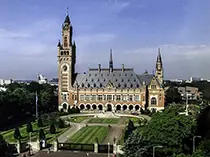Introduction
Whittier Law School, located on a satellite campus in Costa Mesa, California, started in the Hancock Park section of Los Angeles in 1966 as Beverly Law School. In 1975, Beverly College joined Whittier with the law school moving to Costa Mesa in 1997. Whittier Law School has 4,500 alumni, practising in 48 states and 14 countries. The school has been accredited by the American Bar Association (ABA) since 1978 and has been a member of the Association of American Law Schools (AALS) since 1987.
Whittier College, founded in 1887, was named for the Quaker abolitionist and poet John Greenleaf Whittier. Since that time, the institution has grown into a distinctive, national liberal arts college. It serves a diverse student population with unique, widely praised curricula. The College campus provides an intimate environment in which about 1,700 students live and study with more than 100 distinguished faculty. Like other excellent liberal arts colleges, Whittier encourages students to become broadly educated rather than merely trained for a specific career. It emphasizes small, interactive classes led by full-time faculty members and require that students cultivate the analytical, critical thinking, and rhetorical skills that all liberally educated persons enjoy.
Campus
Although the College has maintained no formal affiliation with the Religious Society of Friends since the 1940s, the social values of its Quaker heritage respect for the individual, freedom of conscience, integrity, justice, and internationalism strongly influence its ethos. From the beginning, the same egalitarian views that placed Quakers in the forefront of the battle to abolish slavery dictated that the College opens its doors to persons of both sexes as well as all races and cultures.
Today, the College is a model for the nation with more than 60 percent of its undergraduates, and three of its four Rhodes Scholars, from underrepresented ethnic and international groups. This cultural diversity profoundly strengthens intellectual discourse and provides a realistic exposure to the kind of world students will enter upon graduation. Students and faculty continue a long tradition of community service, echoing the Quaker conviction that helping others is a moral obligation. International study opportunities enrich every field and major, reflecting the Quaker idea that truth transcends the boundaries of race, culture, and nation.
Whittier College Academics
The student-faculty ratio at Whittier College is 12:1, and the school has 57.7 percent of its classes with fewer than 20 students. The most popular majors at Whittier College include: Social Sciences; Business, Management, Marketing, and Related Support Services; Parks, Recreation, Leisure, and Fitness Studies; Biological and Biomedical Sciences; and Psychology. The average freshman retention rate, an indicator of student satisfaction, is 78 percent.
• Psychology
• Social Sciences
• Biological and Biomedical Sciences
• Parks, Recreation, Leisure, and Fitness Studies
• Business, Management, Marketing, and Related Support Services
Student Life
Whittier College has a total undergraduate enrollment of 1,732, with a gender distribution of 42 percent male students and 58 percent female students. In sports, Whittier College is part of the NCAA III. Whittier College is a vibrant, residential four-year liberal arts institution, where intellectual inquiry and experiential learning are fostered in a community that promotes respect for diversity of thought and culture.
With 43 percent of its students hailing from traditionally under-represented groups, and its federal designation as a Hispanic-Serving Institution, Whittier College remains one of the most diverse liberal arts schools in the nation. The Colleges location at the crossroads of Los Angeles and Orange Counties – Southern California’s centers of urban and cultural life – provides unparalleled opportunities to explore a full range of thought, cultures, and talents.
Nationally recognized for its Whittier Scholars Program, interdisciplinary curriculum, and emphasis on linking theory and practice, Whittier Colleges academic program is progressive; students gain a wide breadth of knowledge and the confidence to apply that knowledge, primed to flourish in graduate studies, the evolving global workplace, and life.
























